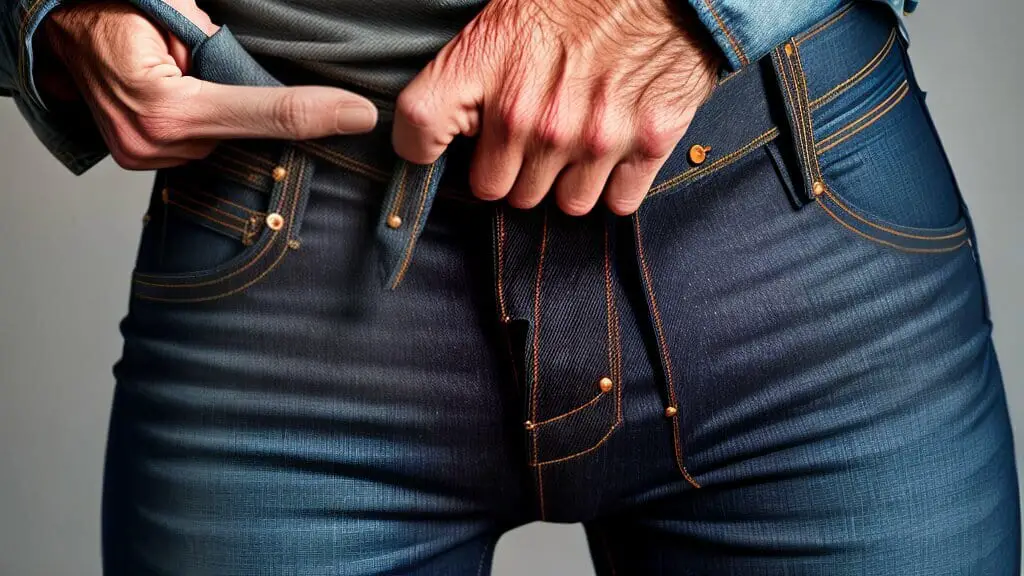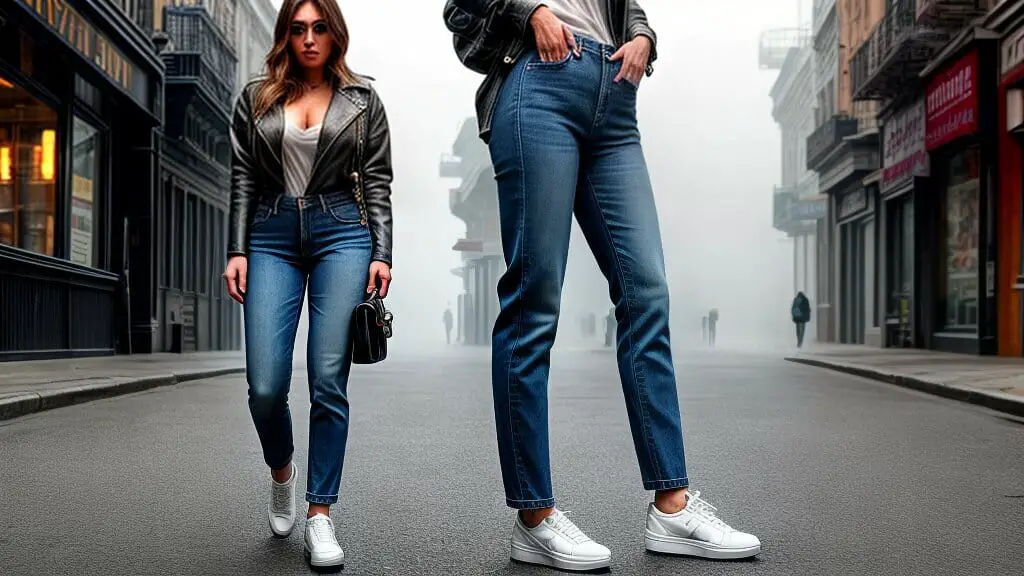Jeans are a staple in every man’s wardrobe, but not all denim is created equal. Enter Mugsy Jeans – the brand that prioritizes both style and comfort, promising to be game-changers in the world of jeans.
In this Mugsy Jeans review, we will delve into the key features and benefits that make these jeans a must-have for any fashion-conscious man. From quality craftsmanship to exceptional comfort and affordability, Mugsy Jeans ticks all the boxes.
Key Takeaways:
- Mugsy Jeans are a game-changer in the world of denim, prioritizing both style and comfort.
- These jeans are crafted with high-quality materials and attention to detail, ensuring durability and longevity.
- The exceptional comfort of Mugsy Jeans is due to the innovative stretch fabric and flexible waistband.
- Mugsy Jeans offer great value for money, as they are affordable compared to other premium denim brands.
The Good Mugsy Jeans for Men
When it comes to men’s denim, Mugsy Jeans is a brand that stands out from the pack. Their innovative stretch fabric and flexible waistband provide a whole new level of comfort, while their modern designs and versatile colors are perfect for any occasion.
One of the most popular options from Mugsy Jeans is their Slim Fit style. This design features a tapered leg and sits comfortably at the waist, delivering a streamlined look that’s easy to dress up or down.
The Dark Blue colorway is a classic choice that pairs well with nearly any outfit, while the Deep Sea and Charcoal Grey shades offer a bit more depth and personality.
| Style | Fit | Color |
|---|---|---|
| Slim Fit | Tapered | Dark Blue |
| Slim Fit | Tapered | Deep Sea |
| Slim Fit | Tapered | Charcoal Grey |
For a more relaxed fit, Mugsy Jeans offers their Straight-Leg style. This design boasts a wider leg opening for a laid-back look that’s ideal for casual wear. The Medium Blue wash is a classic option that pairs well with t-shirts and sneakers, while the Black and Light Blue shades provide some added variety.
| Style | Fit | Color |
|---|---|---|
| Straight-Leg | Relaxed | Medium Blue |
| Straight-Leg | Relaxed | Black |
| Straight-Leg | Relaxed | Light Blue |
No matter which style and color you choose, you can count on Mugsy Jeans to keep you comfortable and stylish all day long. Plus, their affordable price point makes them a great value for denim enthusiasts and fashion-conscious shoppers alike.

Also see: Bonobos Jeans Review
Mugsy Jeans Quality: Unmatched Craftsmanship
When it comes to the quality of Mugsy Jeans, there are no compromises. These jeans are crafted with precision and attention to detail, ensuring they are built to last.
One of the standout features of Mugsy Jeans is the premium materials used in their construction. The brand uses high-quality denim that is both durable and soft to the touch, providing the perfect balance of comfort and longevity. In addition to this, Mugsy Jeans feature advanced stretch technology, allowing for maximum flexibility and ease of movement.
But it’s not just the materials that make Mugsy Jeans stand out. The brand’s dedication to craftsmanship is evident in every stitch and detail. From the reinforced pockets to the sturdy hardware, every element of these jeans is designed to withstand the test of time.
In fact, Mugsy Jeans are so confident in the quality of their products that each pair comes with a lifetime warranty. This ensures that if you ever encounter any issues with your jeans, you can rest assured that the brand will stand behind their product and make it right.

Overall, the quality of Mugsy Jeans is unmatched. These jeans are not only stylish and comfortable, but they are also built to last. If you’re in the market for a new pair of denim that will stand the test of time, look no further than Mugsy Jeans.
Mugsy Jeans Sizing: Find Your Perfect Fit
One of the most important aspects of buying jeans is finding the right size. With Mugsy Jeans, you’ll have a variety of sizes to choose from, ranging from 28 to 44 waist and 28 to 36 inseam lengths. But how do you accurately determine your size?
The first step is to measure your waist and inseam length with a tape measure. Make sure the tape measure is snug but not too tight around your waist, and measure at the narrowest part of your torso. For the inseam, measure from the top of your inner leg down to your ankle.
| Waist Size | Inseam Length |
|---|---|
| 28-29 | 28-29-30-31-32 |
| 30-31-32-33 | 28-29-30-31-32-33 |
| 34-35-36 | 30-31-32-33-34-35-36 |
| 38-40-42-44 | 30-31-32-33-34 |
Once you have your measurements, consult the Mugsy Jeans size chart to find your perfect fit. Keep in mind that Mugsy Jeans are designed with a slim, tapered fit, so if you prefer a looser fit, consider sizing up.
It’s also worth noting that Mugsy Jeans offer a flexible waistband that provides additional stretch and comfort, making them an excellent option for those in between sizes or who prefer a more relaxed fit.
Overall, finding your perfect size with Mugsy Jeans is easy and stress-free. And with their excellent fit and comfort, you’ll never want to wear another pair of jeans again.

Also see: Zara Marine Straight Jeans Review
Mugsy Jeans Comfort: All-Day Wearability
When it comes to denim, comfort is key. That’s why Mugsy Jeans are designed with all-day wearability in mind. The secret lies in their innovative stretch fabric that allows for maximum flexibility and movement without sacrificing style.
But it’s not just the fabric that makes Mugsy Jeans so comfortable. The flexible waistband ensures a snug and secure fit without digging into your skin, while the tapered legs provide a streamlined look without feeling too tight. Whether you’re sitting at your desk or out on the town, Mugsy Jeans will keep you feeling and looking great.
Don’t just take our word for it. “The stretchy fabric of Mugsy Jeans makes them the most comfortable jeans I own,” raves one satisfied customer. Another says, “They’re so comfortable, I feel like I’m wearing sweatpants!”

With Mugsy Jeans, you don’t have to choose between style and comfort. Get the best of both worlds and discover your new favorite denim today.
Mugsy Jeans Price: Affordable Luxury
One of the best things about Mugsy Jeans is their affordability. While they are made with premium materials and unmatched craftsmanship, they are priced competitively compared to other high-end denim brands. This makes them a great value for money, allowing you to get the quality and comfort you deserve without breaking the bank.
Whether you’re looking for a new pair of go-to jeans or want to try something new, Mugsy Jeans are definitely worth considering. With their stylish designs and all-day comfort, they are sure to become your new favorite denim. Plus, with their affordable price point, you can invest in multiple pairs without feeling guilty.

Mugsy Jeans Customer Reviews: What People Are Saying
Don’t just take our word for it – hear from satisfied Mugsy Jeans customers! With over 1,000 5-star reviews, it’s clear that Mugsy Jeans are a fan favorite.
“I’ve been wearing Mugsy Jeans consistently for a year and they’re still as comfortable and stylish as the day I got them.”
Many customers rave about the unmatched comfort of Mugsy Jeans, with one reviewer stating “these jeans feel like pajamas!” The stretch fabric and flexible waistband are often highlighted as standout features, allowing for all-day wear without sacrificing style.
“I’ve never been a jeans person until I found Mugsy Jeans – they’re a game changer.”
Others express their love for the fit and design of Mugsy Jeans, with one happy customer stating “it’s like they were tailored to my body!” The various style options, such as the classic straight leg or modern slim fit, offer something for every taste and body type.

Overall, Mugsy Jeans customers are t illed with their purchases and often become repeat buyers. One satisfied customer sums it up perfectly: “Mugsy Jeans are worth every penny – I won’t wear anything else!”
Mugsy Jeans Review: Pros and Cons
Before making a purchase, it’s important to weigh the pros and cons of any product. Here is a breakdown of the pros and cons of Mugsy Jeans:
| Pros | Cons |
|---|---|
|
|
Overall, the pros of Mugsy Jeans outweigh the cons. They are a great investment for those seeking comfortable, stylish denim at an affordable price. While there may be some minor drawbacks, they are relatively insignificant compared to the overall benefits of wearing Mugsy Jeans.

Image depicting a man wearing Mugsy Jeans
Conclusion: Your New Favorite Denim Awaits
Congratulations! You have reached the end of our Mugsy Jeans review, and we hope you now have a better understanding of why these jeans are becoming increasingly popular among men of all ages. With their unrivaled comfort, superior quality, and affordable pricing, Mugsy Jeans are truly a must-have for any denim lover.
Whether you’re looking for a stylish pair of jeans for a night out with friends or comfortable daily wear, Mugsy Jeans have you covered. With a wide range of sizes, fits, and designs to choose from, you can easily find the perfect pair that fits your unique style and body type.
Don’t just take our word for it – check out the glowing reviews from satisfied customers and see for yourself why Mugsy Jeans are gaining a reputation as some of the best denim on the market. And with their affordable pricing, you won’t have to break the bank to upgrade your wardrobe.
So what are you waiting for? Discover your new favorite denim today and experience the comfort, quality, and style that Mugsy Jeans have to offer. Your wardrobe (and your wallet) will thank you.
FAQ
Q: Are Mugsy Jeans available for women?
A: Currently, Mugsy Jeans primarily offers jeans for men. However, they may expand their product line to include women’s jeans in the future.
Q: Do Mugsy Jeans come in different lengths?
A: Yes, Mugsy Jeans are available in multiple lengths to accommodate different heights. They offer options for both regular and long inseams.
Q: Can I machine wash my Mugsy Jeans?
A: Absolutely! Mugsy Jeans are designed to be easy to care for. You can safely machine wash them using cold water and tumble dry on low heat for best results.
Q: What is the return policy for Mugsy Jeans?
A: Mugsy Jeans offers a hassle-free return policy. If you’re not satisfied with your purchase, you can return the jeans within 30 days of receiving them for a full refund or exchange.
Q: Are Mugsy Jeans suitable for athletic builds?
A: Yes, Mugsy Jeans are perfect for athletic builds. The innovative stretch fabric and flexible waistband provide a comfortable fit, accommodating muscular thighs and a narrower waist.
Q: Can I wear Mugsy Jeans to formal occasions?
A: While Mugsy Jeans are primarily designed for casual wear, certain styles and washes can be dressed up for semi-formal occasions. Pair them with a tailored blazer and dress shoes for a stylish look.


